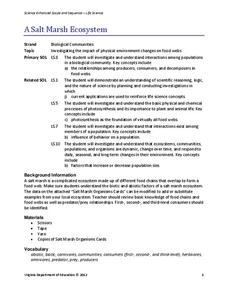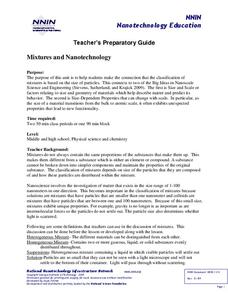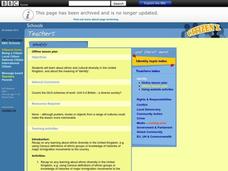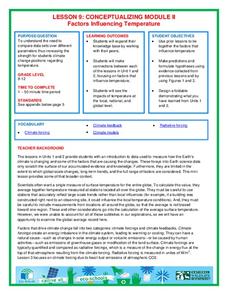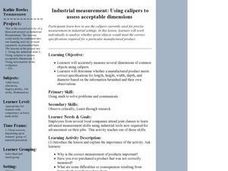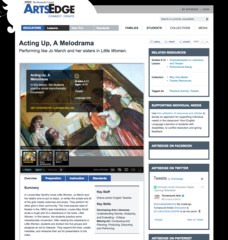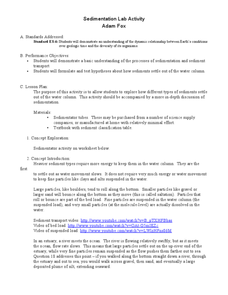Forum
A Research Toolkit of 12 Reading Strategies for the Foreign Language Classroom
Learning to read is not a simple task, but there are methods for assisting pupils as they develop literacy skills. The first four pages of this resource include information about language development and reading development, as well as...
Virginia Department of Education
Mineral Identification
What's the difference between a rock and a mineral? And what properties are used to identify minerals? The first installment of a five-part series on earth materials and processes prompts young scientists to identify a set of...
Virginia Department of Education
A Salt Marsh Ecosystem
What a web we weave. Pupils use yarn as the primary resource to create a web depicting the intricacies of a salt marsh ecosystem. They participate in a question and answer session, which leads to an in-depth facilitated discussion about...
Polar Trec
Ice Cores: Modeling Ice Sheets
Ice cores provide scientists with knowledge of historic melt layers, air temperatures, greenhouse gases, and climate stability. Scholars work in groups to build layers representing snow and ice over thousands of years. Then, groups...
National Nanotechnology Infrastructure Network
Mixtures and Nanotechnology
What does size have to do with it? Learners analyze different mixtures, both homogeneous and heterogeneous, to discover the properties related to the size of their particles. The activity connects these properties to those of...
US Holocaust Museum
Nazi Olympics: Berlin 1936
The Olympics are about more than sports—at times, the games are also a place of racism and prejudice! Pupils investigate the 1936 Olympics in Berlin, Germany. They analyze the meaning behind the materials included in the United States...
Curated OER
Measurement of the Depth of the Ocean
Students comprehend the physical properties of pressure and Boyle's Law by designing a depth gauge. They construct a capillary depth gauge and calculate the calibrated depth marks of the capillary tube. They determine the margin of error...
BBC
Identity
Ethnic diversity is the focus of the political science lesson presented here. In it, pupils discuss the variety of ethnicities they see at their own school. They share their knowledge, or personal experiences of the way that people of...
Curated OER
Espionage and Sedition Acts: Mock Trial
Bring to life the severity of the Espionage and Sedition Acts through a mock trial. Learners have prior knowledge of WWI and the context of these acts. An anticipatory set gets the class discussing the ethics of wartime dissension, and...
Southern Nevada Regional Professional Development Program
Common Core Reading Standards: Understanding Argument
What does your class know about logical fallacies? They can find out quite a bit and practice identifying logical fallacies if you follow the steps and use the resources provided here! After reviewing ethos, pathos, and logos, ask small...
National Wildlife Federation
Conceptualizing Module II - Putting It All Together
"Creativity is just connecting things." - Steve Jobs. After weeks of researching climate change, the ninth lesson in a series of 21 combines the data and analysis to address essential questions. It covers natural phenomenon, human...
Cornell University
Fibers, Dyes, and the Environment
Nanofibers can be made through electrospinning or force spinning in order to reduce the negative impact on the environment. Pupils study the role of fibers and dye on the environment through a series of five hands-on activities. Then,...
NOAA
What's the Big Deal?
Who knew that a possible answer to Earth's energy resource problems was lurking deep beneath the ocean's surface? Part four of a six-part series introduces Earth Science pupils to methane hydrate, a waste product of methanogens. After...
Curated OER
Afghanistan: People, Places and Politics
Students discuss their prior knowledge of Afghanistan. They work together to complete a study guide about Afghanistan's people and places. They present their information to the class.
Curated OER
Music Makers
Students explore distinct styles that have characterized famous musicians and conductors. By studying one musician or conductor in-depth, students become experts on this person's musical style and are given the opportunity to share.
Curated OER
Baseball Statistics
Students take an in depth examine baseball record breakers. They calculate statistics, not just for one year, but over whole careers, to compare some famous players and find who was the best all-time home run hitter.
Curated OER
Industrial Measurement: Using Calipers to Assess Acceptable Dimensions
Students accurately measure several dimensions of common objects using calipers. They determine whether a manufactured product meets correct specifications for length, width, height, depth and diameter.
Curated OER
Great Lakes Ecology
Young scholars are able to use a secchi disk to measure the turbidity of water by determining the depth at which the sechi disk is no longer visible and using the data in a formula to quantify the results. They are able to use Vernier...
Curated OER
Getting into Hot Water
Young scholars discuss the effect of global warming on bodies of water after reading "An Icy Riddle as Big as Greenland" from The New York Times. Students work in groups to research topics related to global warming and Greenland's...
Curated OER
Terrible Things
Students reflect on the Holocaust in two lessons. Using prior knowledge, they investigate and make decisions dealing with human behavior before beginning their studies on the Holocaust. After examining different aspects of the event,...
John F. Kennedy Center
Acting Up, A Melodrama: Performing Like Jo March and Her Sisters in Little Women
Lights, Camera, Action! Pupils read Little Women and create, act, and direct a melodrama that Jo March and her sisters would enjoy. The lesson plan comes complete with resources for the educator on melodrama as well as examples for drama...
Curated OER
Sedimentation Lab Activity
Students predict how sediments in a water column will settle. For this earth science lesson, students examine the layers of sedimentation. Students are given sediments to place into a column of water and observe how they settle....
Curated OER
Causes of the Civil War: Missouri Compromise, Compromise of 1850 and Kansas Nebraska Act
How did the Missouri Compromise, the Compromise of 1850, and the Kansas-Nebraska Act contribute to the growing tensions that led to the Civil war? To better understand the events that led to the Civil War, young historians engage in a...
Curated OER
World War II Webquest
Tenth graders work with a partner to locate and follow the directions of a webquest of their choice. Using the internet, they research their topic in depth and write a paper on their findings. They are assessed by the criteria on the...




